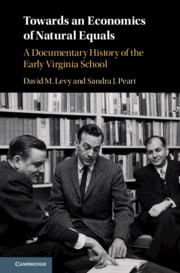Book contents
- Towards an Economics of Natural Equals
- Frontispiece
- Towards an Economics of Natural Equals
- Copyright page
- Dedication
- Contents
- Figures
- Tables
- Preface
- Acknowledgments
- 1 Why the Virginia School of Political Economy Matters
- 2 James Buchanan and the Return to an Economics of Natural Equals
- 3 “Almost Wholly Negative”: An Early Reaction to the Virginia School
- 4 “The Economics of Universal Education” and After: From Friedman to Rawls
- 5 Virginia Political Economy and Public Choice Economics
- 6 The Individuals and Their Connections
- 7 The Role of the Earhart Foundation in the Early Virginia School
- 8 The Virginia School and the Anti-democratic Right
- 9 Neoliberalism, the Virginia School, and the Geldard Report
- 10 Conclusion: Should the Virginia School be Restored?
- Select Bibliography
- Index
- References
6 - The Individuals and Their Connections
Published online by Cambridge University Press: 16 December 2019
- Towards an Economics of Natural Equals
- Frontispiece
- Towards an Economics of Natural Equals
- Copyright page
- Dedication
- Contents
- Figures
- Tables
- Preface
- Acknowledgments
- 1 Why the Virginia School of Political Economy Matters
- 2 James Buchanan and the Return to an Economics of Natural Equals
- 3 “Almost Wholly Negative”: An Early Reaction to the Virginia School
- 4 “The Economics of Universal Education” and After: From Friedman to Rawls
- 5 Virginia Political Economy and Public Choice Economics
- 6 The Individuals and Their Connections
- 7 The Role of the Earhart Foundation in the Early Virginia School
- 8 The Virginia School and the Anti-democratic Right
- 9 Neoliberalism, the Virginia School, and the Geldard Report
- 10 Conclusion: Should the Virginia School be Restored?
- Select Bibliography
- Index
- References
Summary
the ideological spectrum. Buchanan wrote against Hayek’s evolutionary efficiency claims as well as efficiency claims in rational expectations theories. Hayek’s endorsement of the “liberal dictator” provides the background for Buchanan’s concern with anti-democratic elements of the Mont Pelerin Society. The demise of the Soviet Union has obscured how controversial Nutter’s NBER work was. In the early 1960s, a principles of economics textbook labeled Nutter’s results, reported in Hazlitt’s Newsweek column, as biased. Nutter and Rostow, who differed politically, agreed in their analyses of Soviet growth that Russian culture persisted in spite of the transition to the Soviet Union. Tullock’s long-standing friendship with Popper was critical for the early Virginia School’s analytical egalitarianism in which the motivation of the economist is no different than the motivation of those in the economist’s model. This speaks to ideological motivation. Tullock held that, since economics did not enforce replication, it lacked standing as science and was instead akin to a “racket.”
Keywords
- Type
- Chapter
- Information
- Towards an Economics of Natural EqualsA Documentary History of the Early Virginia School, pp. 164 - 194Publisher: Cambridge University PressPrint publication year: 2020

